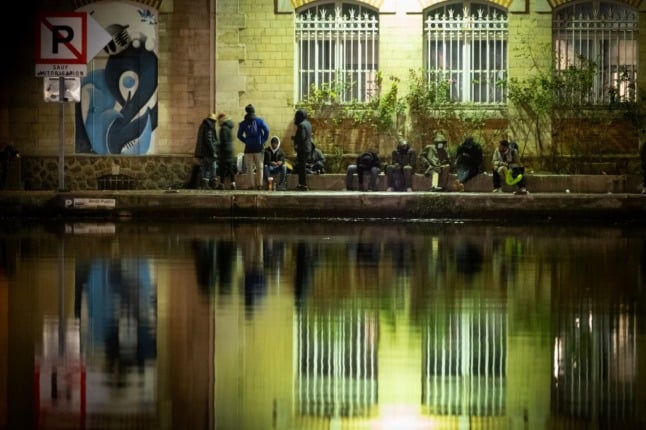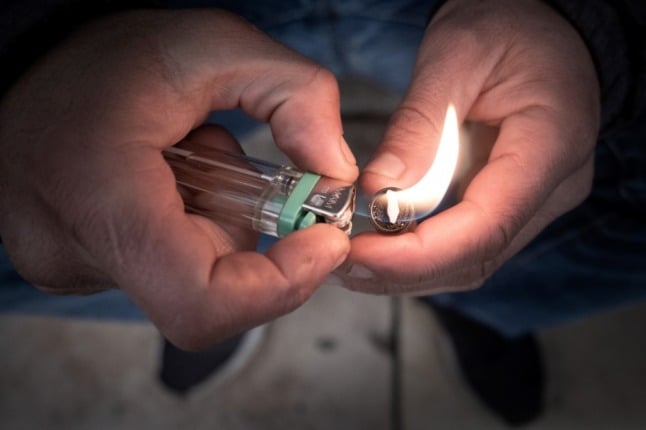For months, the Stalingrad area in the capital’s 19th arrondissement has been plagued by drug traffickers trading in crack cocaine, who moved in after a nearby area – known as Crack Hill – was evacuated in 2019.
Significant police resources had been deployed for a year to try to contain the problem. Officers have patrolled the area 24 hours a day. Benches have been removed to stop users congregating, public lighting has been improved, traffickers have been targeted, and users systematically referred to rehabilitation programmes and barred from entering the area.
But the issue remains and has been the subject of noisy protests by exasperated locals.
8pm and residents on this Paris street in 19th are on their balconies banging pots and pans and making a racket. Not to support hospital workers as they did last year but to say they have had enough of their neighbourhood being taken over by crack dealers and addicts… pic.twitter.com/rEpcZNllRG
— Ben McPartland (@McPBen) May 17, 2021
In a letter addressed to Paris MP Mounir Mahjoubi, the minister said that dealers and users would be moved on ‘in the coming days’.
Discussions on the issue between the government and Paris City Hall had been under way since February Darmanin said, with the plan being “to migrate the scene to another Parisian place … by carrying out a binding operation vis-à-vis drug addicts and associations that accompany them.
“This new place would be occupied temporarily, with a new evacuation after a few months”.
READ ALSO: ‘The capital of crack’ – Why can’t Paris deal with its drug problem?

The Minister laid some of the blame for the problems at Stalingrad at the door of City Hall.
“Food distributions, whether they are explicitly authorised by the city of Paris or tolerated, contribute to the creation of a point of fixation for Stalingrad in the evening … and of the Jardins d’Eole during the day,” he wrote in his letter to Mahjoubi.
On Monday, police began to close off Place Stalingrad to users and dealers after plans to clear the area were brought forward because of rising tensions with residents. Patrols have been stepped up to prevent addicts loitering in the squad and near apartment buildings.
Meanwhile, some 500m away, the Jardins d’Eole – where about 150 addicts would gather during the day – has remained open until 1am every night, way past its usual closing time.
“It is not only a place that they know well since many drug addicts spend their day in the upper part of this park, but it is also an area where there are relatively few residents and where the nuisance will therefore be less significant,” a police officer told 20 minutes.
After the park closes, those addicts still on the streets are confined to rue Ricquet, which borders the park and then spans the railroad tracks. It is a street with few apartment buildings but is not far from residential areas.
The operation has not gone down well with those living nearby.
“We are flabbergasted by this decision,” Frédéric Francelle, head of a group of residents told Le Figaro. “We endure from morning to night the cries, the brawls of the crack dealers and all kinds of nuisances.
“We are the sacrificed,” he said, arguing that this decision will hurt the whole district and will not solve the problems or placate the fears of residents.
The arrondissement’s mayor François Dagnaud has admitted the solution is far from a miracle cure – but described it as the ‘least bad’ short-term option.
He described the recent actions of local residents as a ‘cry for help’. “We must measure the exasperation of residents who no longer sleep at night because of the shouting and settling of scores, the feeling of permanent insecurity …”
This solution is temporary, he added. It was intended to calm tensions in Place Stalingrad before café terraces and cinemas reopened on Wednesday.
A decree issued on Monday by the Paris police chief prohibits the distribution of food and syringes in the square – but not at the Jardins d’Eole. “Of course that shifts the problem – but to less populated areas,” insists Dagnaud
“For the moment, we have to admit that nothing that has been put in place has made it possible to eliminate the problem.”
A report published in January after a two-year study by ans, l’Inserm and l’Observatoire français des drogues et toxicomanie (OFDT) recommended the opening of specialised facilities for crack users – as well as four supervised inhalation rooms, similar to shooting rooms, to limit consumption in public spaces.
City Hall is said to favour the recommendations, but police and judicial authorities fear that they would set a dangerous precedent.
Meanwhile, Mahjoubi has another suggestion: move the addicts – and the problem – to Les Invalides.
“This is where we find the fewest shops and homes. Then set up tents there to accommodate this population,” he said. “But for this to work and if we do not want to alienate the population, social monitoring and the security system must work 24 hours a day.”



 Please whitelist us to continue reading.
Please whitelist us to continue reading.
Member comments